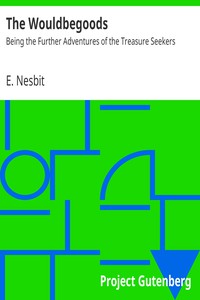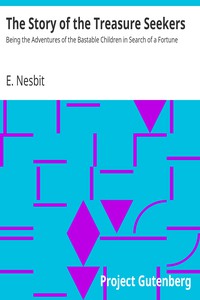The Wouldbegoods: Being the Further Adventures of the Treasure Seekers, E. Nesbit [red novels .TXT] 📗

- Author: E. Nesbit
Book online «The Wouldbegoods: Being the Further Adventures of the Treasure Seekers, E. Nesbit [red novels .TXT] 📗». Author E. Nesbit
CHAPTER 9. HUNTING THE FOX
It is idle to expect everyone to know everything in the world without being told. If we had been brought up in the country we should have known that it is not done—to hunt the fox in August. But in the Lewisham Road the most observing boy does not notice the dates when it is proper to hunt foxes.
And there are some things you cannot bear to think that anybody would think you would do; that is why I wish to say plainly at the very beginning that none of us would have shot a fox on purpose even to save our skins. Of course, if a man were at bay in a cave, and had to defend girls from the simultaneous attack of a herd of savage foxes it would be different. A man is bound to protect girls and take care of them—they can jolly well take care of themselves really it seems to me—still, this is what Albert’s uncle calls one of the ‘rules of the game’, so we are bound to defend them and fight for them to the death, if needful. Denny knows a quotation which says—
‘What dire offence from harmless causes springs, What mighty contests rise from trefoil things.’He says this means that all great events come from three things—threefold, like the clover or trefoil, and the causes are always harmless. Trefoil is short for threefold.
There were certainly three things that led up to the adventure which is now going to be told you. The first was our Indian uncle coming down to the country to see us. The second was Denny’s tooth. The third was only our wanting to go hunting; but if you count it in it makes the thing about the trefoil come right. And all these causes were harmless.
It is a flattering thing to say, and it was not Oswald who said it, but Dora. She said she was certain our uncle missed us, and that he felt he could no longer live without seeing his dear ones (that was us).
Anyway, he came down, without warning, which is one of the few bad habits that excellent Indian man has, and this habit has ended in unpleasantness more than once, as when we played jungles.
However, this time it was all right. He came on rather a dull kind of day, when no one had thought of anything particularly amusing to do. So that, as it happened to be dinner-time and we had just washed our hands and faces, we were all spotlessly clean (com-pared with what we are sometimes, I mean, of course).
We were just sitting down to dinner, and Albert’s uncle was just plunging the knife into the hot heart of the steak pudding, when there was the rumble of wheels, and the station fly stopped at the garden gate. And in the fly, sitting very upright, with his hands on his knees, was our Indian relative so much beloved. He looked very smart, with a rose in his buttonhole. How different from what he looked in other days when he helped us to pretend that our currant pudding was a wild boar we were killing with our forks. Yet, though tidier, his heart still beat kind and true. You should not judge people harshly because their clothes are tidy. He had dinner with us, and then we showed him round the place, and told him everything we thought he would like to hear, and about the Tower of Mystery, and he said—
‘It makes my blood boil to think of it.’
Noel said he was sorry for that, because everyone else we had told it to had owned, when we asked them, that it froze their blood.
‘Ah,’ said the Uncle, ‘but in India we learn how to freeze our blood and boil it at the same time.’
In those hot longitudes, perhaps, the blood is always near boiling-point, which accounts for Indian tempers, though not for the curry and pepper they eat. But I must not wander; there is no curry at all in this story. About temper I will not say.
Then Uncle let us all go with him to the station when the fly came back for him; and when we said good-bye he tipped us all half a quid, without any insidious distinctions about age or considering whether you were a boy or a girl. Our Indian uncle is a true-born Briton, with no nonsense about him.
We cheered him like one man as the train went off, and then we offered the fly-driver a shilling to take us back to the four cross-roads, and the grateful creature did it for nothing because, he said, the gent had tipped him something like. How scarce is true gratitude! So we cheered the driver too for this rare virtue, and then went home to talk about what we should do with our money. I cannot tell you all that we did with it, because money melts away ‘like snow-wreaths in thaw-jean’, as Denny says, and somehow the more you have the more quickly it melts. We all went into Maidstone, and came back with the most beautiful lot of brown-paper parcels, with things inside that supplied long-felt wants. But none of them belongs to this narration, except what Oswald and Denny clubbed to buy.
This was a pistol, and it took all the money they both had, but when Oswald felt the uncomfortable inside sensation that reminds you who it is and his money that are soon parted he said to himself—
‘I don’t care. We ought to have a pistol in the house, and one that will go off, too—not those rotten flintlocks. Suppose there should be burglars and us totally unarmed?’
We took it in turns to have the pistol, and we decided always to practise with it far from the house, so as not to frighten the grown-ups, who are always much nervouser about firearms than we are.
It was Denny’s idea getting it; and Oswald owns it surprised him, but the boy was much changed in his character. We got it while the others were grubbing at the pastry-cook’s in the High Street, and we said nothing till after tea, though it was hard not to fire at the birds on the telegraph wires as we came home in the train.
After tea we called a council in the straw-loft, and Oswald said—
‘Denny and I have got a secret.’
‘I know what it is,’ Dicky said contemptibly. ‘You’ve found out that shop in Maidstone where peppermint rock is four ounces a penny. H. O. and I found it out before you did.’
Oswald said, ‘You shut-up. If you don’t want to hear the secret you’d better bunk. I’m going to administer the secret oath.’
This is a very solemn oath, and only used about real things, and never for pretending ones, so Dicky said—
‘Oh, all right; go ahead! I thought you were only rotting.’
So they all took the secret oath. Noel made it up long before, when he had found the first thrush’s nest we ever saw in the Blackheath garden:
‘I will not tell, I will not reveal, I will not touch, or try to steal;




Comments (0)